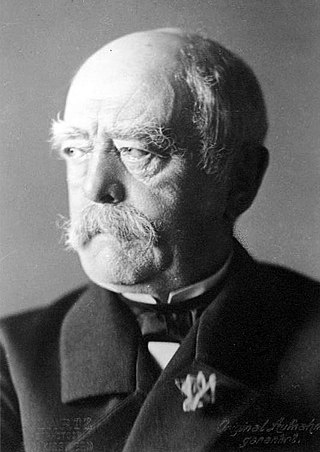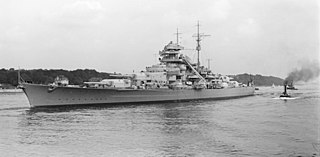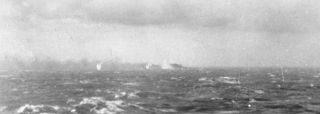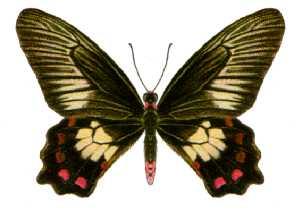
The German Empire, also referred to as Imperial Germany, the Second Reich or simply Germany, was the period of the German Reich from the unification of Germany in 1871 until the November Revolution in 1918, when the German Reich changed its form of government from a monarchy to a republic.

Otto, Prince of Bismarck, Count of Bismarck-Schönhausen, Duke of Lauenburg was a Prussian and later German statesman and diplomat. Bismarck's Realpolitik and powerful rule led to him being called the Iron Chancellor.

Bismarck is the capital of the U.S. state of North Dakota and the county seat of Burleigh County. It is the state's 2nd most populous city, after Fargo. The population was 73,622 at the 2020 census, and was estimated to be 74,445 in 2022, while its metropolitan population was 133,626. In 2020, Forbes magazine ranked Bismarck as the seventh fastest-growing small city in the United States.

Bismarck was the first of two Bismarck-class battleships built for Nazi Germany's Kriegsmarine. Named after Chancellor Otto von Bismarck, the ship was laid down at the Blohm & Voss shipyard in Hamburg in July 1936 and launched in February 1939. Work was completed in August 1940, when she was commissioned into the German fleet. Bismarck and her sister ship Tirpitz were the largest battleships ever built by Germany, and two of the largest built by any European power.

The North German Confederation was initially a German military alliance established in August 1866 under the leadership of the Kingdom of Prussia, which was transformed in the subsequent year into a confederated state that existed from July 1867 to December 1870. A milestone of the German Unification, it was the earliest continual legal predecessor of the modern German nation-state known today as the Federal Republic of Germany.

The Bismarck Archipelago is a group of islands off the northeastern coast of New Guinea in the western Pacific Ocean and is part of the Islands Region of Papua New Guinea. Its area is about 50,000 square km.

The Bismarck Sea lies in the southwestern Pacific Ocean within the nation of Papua New Guinea. It is located northeast of the island of New Guinea and south of the Bismarck Archipelago. It has coastlines in districts of the Islands Region, Momase Region, and Papua Region.
KFYR-TV is a television station in Bismarck, North Dakota, United States, affiliated with NBC and Fox. Owned by Gray Television, the station has studios on North 4th Street and East Broadway Avenue in downtown Bismarck, and its transmitter is located near St. Anthony, North Dakota.

Friedrichsruh is a district in the municipality of Aumühle, Herzogtum Lauenburg district, Schleswig-Holstein, in northern Germany. Friedrichsruh manor is known as a residence of the princely House of Bismarck, mainly of Chancellor Otto von Bismarck from 1871 onwards.

KBMR, known as "Country 1130", is a radio station located in Bismarck, North Dakota, owned by iHeartMedia, Inc. The station runs a classic country format. It is one of six iHeartMedia-owned stations in the Bismarck-Mandan area.

The last battle of the German battleship Bismarck took place in the Atlantic Ocean approximately 300 nautical miles west of Brest, France, on 26–27 May 1941 between the German battleship Bismarck and naval and air elements of the British Royal Navy. Although it was a decisive action between capital ships, it has no generally accepted name. It was the culmination of Operation Rheinübung where the attempt of two German ships to disrupt the Atlantic Convoys to the United Kingdom failed with the scuttling of the Bismarck.

Hypolycaena erylus, the common tit, is a small but striking butterfly found in India and South-East Asia that belongs to the lycaenids or blues family. The species was first described by Jean-Baptiste Godart in 1823.

Papilio ulysses, the Ulysses butterfly or the blue mountain swallowtail butterfly, , is a large swallowtail butterfly of Australia, Indonesia, Papua New Guinea and the Solomon Islands. Its size varies depending on subspecies, but the wingspan is about 10.5 cm (4.1 in) in Queensland.

Graphium stresemanni is a vulnerable species of butterfly in the family Papilionidae. It is endemic to the Indonesian island of Seram. It closely resembles the related Graphium weiskei, a more common species from New Guinea but has been treated as a distinct species. It is rare. The species was first described by Walter Rothschild in 1916.

Catochrysops panormus, the silver forget-me-not, is a small butterfly found from India to the Philippines and south to Australia that belongs to the lycaenids or blues family. The species was first described by Cajetan Felder in 1860.

Bastilla solomonensis is a moth of the family Noctuidae first described by George Hampson in 1913. It is found on the Solomon Islands, the Bismarck Islands, New Caledonia, Vanuatu, New Guinea, Australia, Kei Island, the Moluccas, Java, Mindanao and the Philippines.

The Bismarck class was a pair of fast battleships built for Nazi Germany's Kriegsmarine shortly before the outbreak of World War II. The ships were the largest and most powerful warships built for the Kriegsmarine; displacing more than 41,000 metric tons normally, they were armed with a battery of eight 38 cm (15 in) guns and were capable of a top speed of 30 knots. Bismarck was laid down in July 1936 and completed in September 1940, while her sister Tirpitz's keel was laid in October 1936 and work finished in February 1941. The ships were ordered in response to the French Richelieu-class battleships. They were designed with the traditional role of engaging enemy battleships in home waters in mind, though the German naval command envisioned employing the ships as long-range commerce raiders against British shipping in the Atlantic Ocean. As such, their design represented the strategic confusion that dominated German naval construction in the 1930s.

Pachliopta polydorus, the red-bodied swallowtail, is a butterfly from the family Papilionidae found in north-eastern Queensland, Australia and Papua New Guinea.

Didiguides is a monotypic moth genus of the family Nolidae erected by Lutz W. R. Kobes in 1994. Its only species, Didiguides semifervens, was first described by Francis Walker in 1863. It is found on Borneo, Sumatra and Sulawesi, as well as in New Guinea and on the Bismarck Islands. The habitat consists of dipterocarp forests, including alluvial forests.















